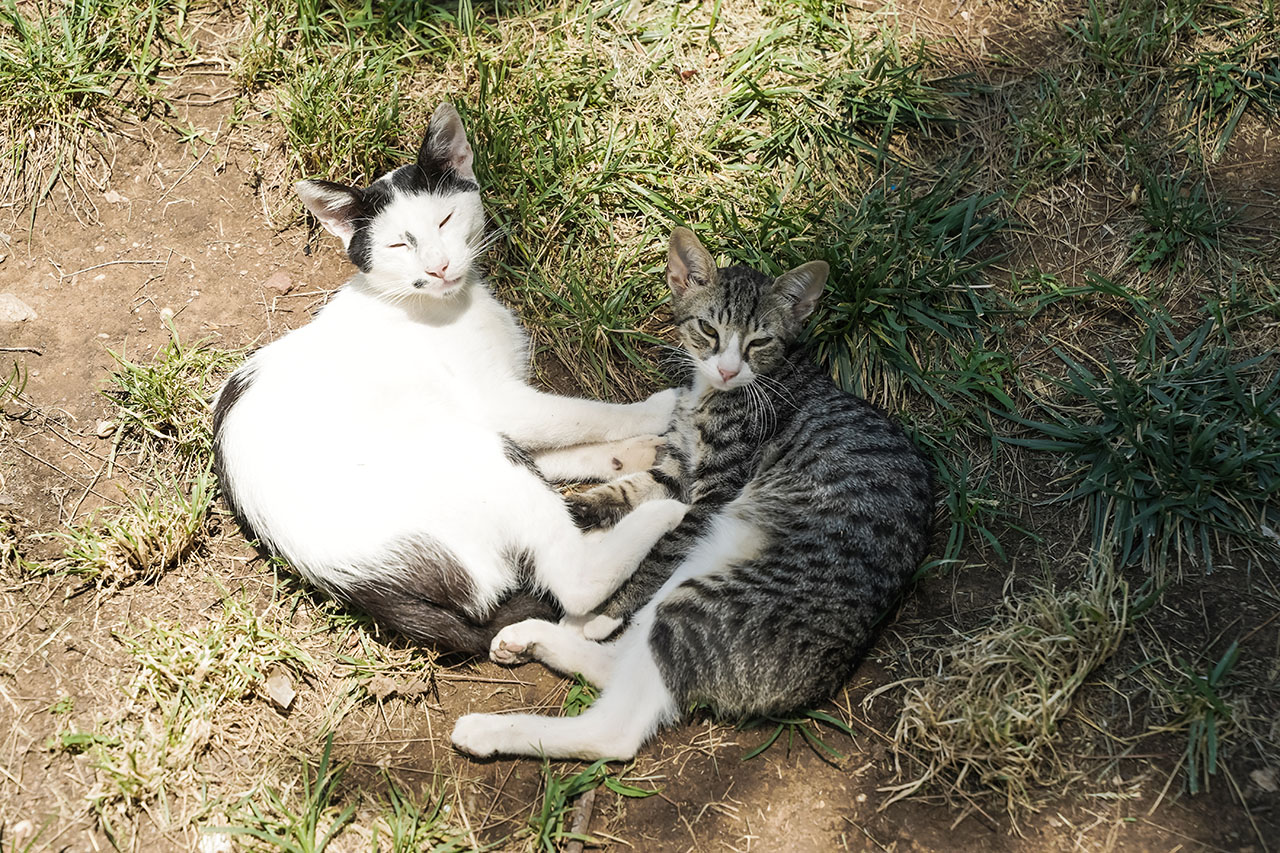4 Healthy Tips for Cats in Hot Weather
It is very important to keep your furry feline healthy all year round, but the summer months require some situations that need specific action on your part as the cat owner. Below are 4 healthy tips for cats in hot weather months.
1. Keeping Your Cat Indoors or Outdoors
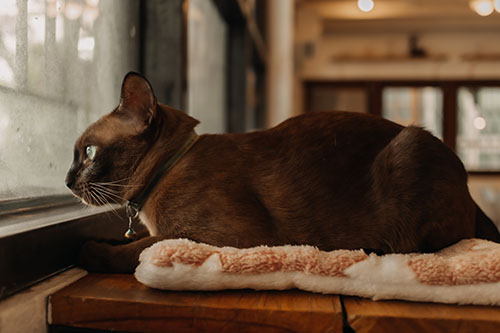
Keeping your cat indoors all the time under air-conditioning is a good thing. In fact, keeping them in the house help avoid problems such as heat stroke. In addition, fleas and ticks may not be as problematic on indoor cats but not necessarily. Most cats desire to be in the great outdoors. They rush to the front door each time it opens and enjoys sitting at the window calling out to people or animals passing by. As a cat owner, you must create an environment your cat can enjoy. Purchase toys, a scratching post, as well as a cat tower with hiding holes. There are lots of ways to enrich your cat indoors and avoid the extreme outdoor heat.
On the other hand, many cats are miserable if they are always kept indoors. If you choose to allow your cat to roam outdoors during the humid summer months, be sure they have access to a shady area and a cool bowl of water. If possible, ensure your cat has easy access to the indoors, whether through the garage or pet door, so that they can cool off when needed. But you must know that being outdoors and having contact with other animals and people creates a long list of health concerns for cats, including the following:
- Heatstroke
- Bacterial, viral, and fungal infections
- Possible wounds from fighting with other animals
- Contracting contagious diseases such as rabies, feline leukemia, and Feline Immunodeficiency Virus (FIV)
- Parasites such as fleas, tick, ringworm, and roundworms
- Poisoning from ingesting toxic chemicals pesticides, antifreeze, and rat poison
2. Keeping Your Cat Hydrated
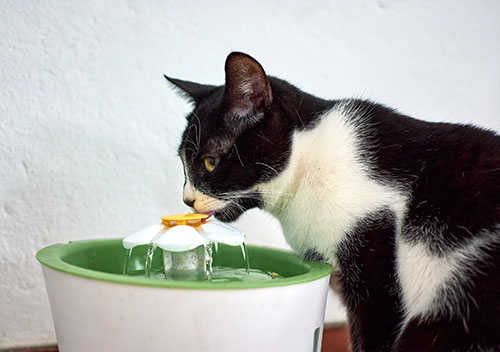
Having enough water available for your cat is important all year round, but in the summer, you must pay additional attention. Cats must drink plenty of water during the humid summer months to prevent dehydration. Providing lots of fresh, clean water is essential. It is hard to keep water cool in the hot blazing sun, and it evaporates quickly. One great way to keep water cool in your cat’s outdoor water bowl is by adding a block of ice. You simply freeze a plastic container, such as a margarine tub, full of water, then freeze it and turn the block of ice out into the water bowl. Once the block of ice is in the bowl, pour cool water over and around the ice block. The blow will then slowly melt during the day. As a result, the ice will melt and drip cold water all during the day.
You can also create a cool ice pack for your cat by freezing a bottle of water and wrapping it in a towel or blanket. This ice pack is perfect to place into their bed or their favorite lounging area, providing much-needed cooling from the summer heat.
Another great idea is to freeze a plastic 2-liter bottle full of water. Then use a wire or thick string to hand the bottle cap side down over a bowl. The ice will then melt and drip cold water into the bowl all day.
3. Shedding and Hairballs
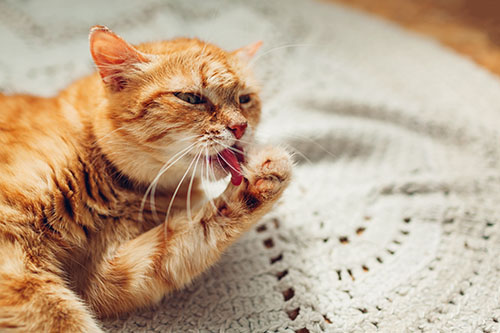
With the warm summer weather, cats begin to shed a fluffy winter coat to a more manageable, lighter summer coat. In addition, shedding leads to extra hair-swallowing as cats groom themselves. This can lead to hairballs or vomiting, and even dangerous blockages that may require veterinary care. You can assist in preventing hairballs by regular combing, bathing, and grooming to remove their hair before it can be ingested by your furry pet. You can also give your cat an oil-based hairball preventative during the summer months. These preventatives come in a tube and are smeared on the cat’s paw. The cat will then like the oil-based hairball preventative off. You may also find hairball prevention formula cat food and treats.
4. Fleas and Ticks
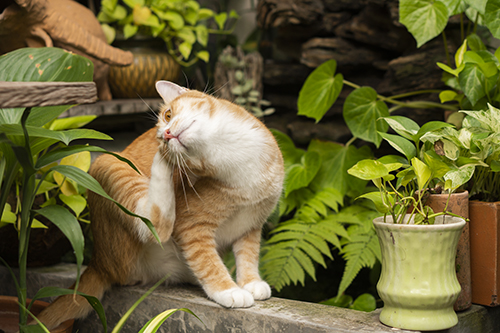
The summer temperatures and increased humidity provide the ideal conditions for fleas and ticks. During the summer our pets usually spend more time outdoors, as a result putting them at an increased risk of attracting the common pests. Fleas feed on your cat’s blood and can cause cat scratch disease in cats which can then spread to you, the owner. Did you know fleas are also the number one cause of tapeworms in pets? Yes, fleas are the number one cause of tapeworms in pets. Ticks on the other hand feed on many different animals and are known to spread Lyme disease, anaplasmosis, tularemia, and many other diseases to both our pets and human. Even indoor cats need flea and tick prevention, and sometimes treatment. Flea eggs and adult ticks can easily be carried indoors on shoes and clothing. Outdoor cats will need to have preventative treatment too, and for your outdoor cat, look for flea and tick medication that repels mosquitoes as well. Whether you go natural or chemical, start your flea prevention measures early in May, experts recommend. It’s easier to stave off an infestation than effectively treat one.
Below are additional ways to protect your cat from fleas and ticks:
- Vacuum the carpets and furniture regularly and empty the vacuum bags often.
- Frequently wash your bed sheets, rugs, and pet bedding.
- Keep your lawn groomed regularly to keep tall grass at bay.
- Rake up leaves and clear brush from your lawn around the home.
- Contact a professional pet control agency to provide the best treatment options for flea, ticks, and other pests.
4 Healthy Tips for Cats in Hot Weather
In conclusion, we here at Poodah’s Dog Walking and Pet Sitting Services hope these 4 healthy tips for cats in hot weather help you take better care of your pet during this extremely hot summer. Come back soon for more pet safety tips and learn more about our cat care services!

